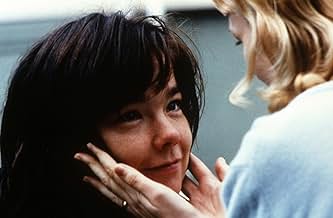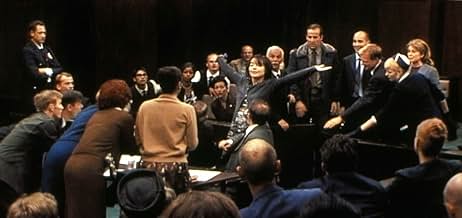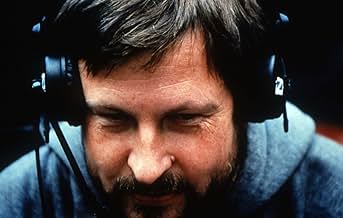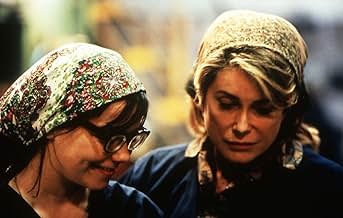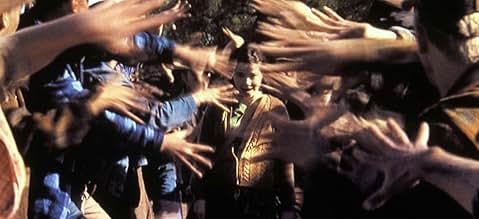Una ragazza dell'Est Europa va in America con il suo bambino, aspettandosi che sia come nei film di Hollywood.Una ragazza dell'Est Europa va in America con il suo bambino, aspettandosi che sia come nei film di Hollywood.Una ragazza dell'Est Europa va in America con il suo bambino, aspettandosi che sia come nei film di Hollywood.
- Regia
- Sceneggiatura
- Star
- Candidato a 1 Oscar
- 34 vittorie e 48 candidature totali
Siobhan Fallon Hogan
- Brenda
- (as Siobhan Fallon)
Recensioni in evidenza
Why? Because it's a one of a kind movie. The acting is superb (especially Bjork), direction assured and the musical numbers are great. Still, it's the most depressing film I've ever seen. By the end of the film I was crying practically non-stop. It's so bleak I don't think I'll ever see it again, but it should be seen at least once by everybody. It shows misery and suffering full throttle. You'll either love it or loathe it (I'm somewhere in th middle), but you'll never see anything like it again and you won't forget it. Just bring lots of Kleenex.
The reviews were extremely black and white for this art-house film. People were either enthralled or bored to tears by the whole experience. There seemed to be no middle ground. Now, that's my kind of movie. Any picture that can reap awards (Cannes Film Festival) and get lambasted by the general public at the same time will always pique my interest. In respect, it was a rich, rewarding odyssey, much easier to get through than, let's say, even half of "8½."
My initial respect for the unique, uncompromising style of Danish director Lars von Trier goes back to his compelling work in "Zentropa" and "Breaking the Waves," both bleak, surrealistic studies of man vs. reality. His pieces usually center around some innocent, simple-minded, self-sacrificing soul who inevitably succumbs to the cruelties of life.
I found the central role of Selma (as played by the extraordinary Björk) to be very much the emotional equivalent of Emily Watson's touchingly childlike, near-sociopath Bess in "Breaking the Waves" -- blessed and cursed with a naive, soulful purity. Selma represents one of God's little quirks of nature. A bespectacled, pathetically infantile little ragamuffin completely out of touch, Selma has somehow survived like the runt of a litter would - through luck, will power, and the extreme kindness of those around her. An impoverished Czech-born emigré living in a small Northwestern U.S. industrial town during the mid-60s, this luckless creature manages to eek out a meager Airstream-like existence as a factory worker, despite the fact she is legally blind.
Selma is, amazingly enough, a mother. Seemingly ill-equipped to care for a child much less herself, she has nevertheless managed to provide for the 12-year-old boy, while nurturing the child as a young girl would her rag doll. The fairly adjusted boy suffers, however, from the same optic disease as the mother, while the crux of the story revolves around her attempts to save up money for his inevitable operation.
The fascination of "Dancer in the Dark" lies in Selma's musical world. With her eyesight failing, her ears become the only sense of joy, falling periodically into bouts of fantasy anytime she grabs onto a rhythm or beat (like machine sounds, train engines, etc.), wherein she becomes the star of her own working-class musical production. These compelling sequences become mere extensions of her real-life circumstances, i.e., the musical interludes at work will include the factory itself as a set piece and the other workers as her ensemble. A strange mix of Fellini neo-realism and Busby Berkeley illusion, these daydreams (sparked by Vincent Paterson's inventive choreography and von Trier's purposely puerile lyrics) become her only escape. Björk's odd musical talent and vocal style may be an acquired taste, but she is so mesmerizing here it becomes a non-issue. In addition, there are brief moments of levity as a hopelessly inept community theater production of "The Sound of Music" goes into rehearsals with the very awkward Selma playing Maria.
The subordinate cast is equally in tune. The wonderful, beguiling French star Catherine Deneuve downplays her ethereal beauty as Kathy, Selma's co-worker and trusted friend. And a strange, maternalistic friendship it is indeed, for this woman seems to have no other purpose in life than to be this girl's eyes and hands, looking out for her practically day and night. Peter ("Fargo") Stormare shies away from his ruthless killer image with this touching portrayal of a sensitive, almost pitiable boor who only has eyes for the ungainly Selma. David Morse is gripping as a seemingly compassionate but despairing policeman whose one desperate act involving neighbor Selma results in tragedy. Joel Grey has a brief, telling moment near the film's end as a faded musical star idolized by Selma.
As in his other featured works, von Trier's gritty, hand-held camera work may be dizzying to the point of distraction at first but its overall impact to the stark proceedings is unquestionable. Moreover, the grueling paces he puts his actresses through to achieve absolute truth borders on misogyny but the rewards are tenfold. As in the case of Emily Watson, Björk has never shined brighter as an artist.
A harrowing, refreshingly original piece of filmmaking that should be experienced by anybody who dares to be different.
My initial respect for the unique, uncompromising style of Danish director Lars von Trier goes back to his compelling work in "Zentropa" and "Breaking the Waves," both bleak, surrealistic studies of man vs. reality. His pieces usually center around some innocent, simple-minded, self-sacrificing soul who inevitably succumbs to the cruelties of life.
I found the central role of Selma (as played by the extraordinary Björk) to be very much the emotional equivalent of Emily Watson's touchingly childlike, near-sociopath Bess in "Breaking the Waves" -- blessed and cursed with a naive, soulful purity. Selma represents one of God's little quirks of nature. A bespectacled, pathetically infantile little ragamuffin completely out of touch, Selma has somehow survived like the runt of a litter would - through luck, will power, and the extreme kindness of those around her. An impoverished Czech-born emigré living in a small Northwestern U.S. industrial town during the mid-60s, this luckless creature manages to eek out a meager Airstream-like existence as a factory worker, despite the fact she is legally blind.
Selma is, amazingly enough, a mother. Seemingly ill-equipped to care for a child much less herself, she has nevertheless managed to provide for the 12-year-old boy, while nurturing the child as a young girl would her rag doll. The fairly adjusted boy suffers, however, from the same optic disease as the mother, while the crux of the story revolves around her attempts to save up money for his inevitable operation.
The fascination of "Dancer in the Dark" lies in Selma's musical world. With her eyesight failing, her ears become the only sense of joy, falling periodically into bouts of fantasy anytime she grabs onto a rhythm or beat (like machine sounds, train engines, etc.), wherein she becomes the star of her own working-class musical production. These compelling sequences become mere extensions of her real-life circumstances, i.e., the musical interludes at work will include the factory itself as a set piece and the other workers as her ensemble. A strange mix of Fellini neo-realism and Busby Berkeley illusion, these daydreams (sparked by Vincent Paterson's inventive choreography and von Trier's purposely puerile lyrics) become her only escape. Björk's odd musical talent and vocal style may be an acquired taste, but she is so mesmerizing here it becomes a non-issue. In addition, there are brief moments of levity as a hopelessly inept community theater production of "The Sound of Music" goes into rehearsals with the very awkward Selma playing Maria.
The subordinate cast is equally in tune. The wonderful, beguiling French star Catherine Deneuve downplays her ethereal beauty as Kathy, Selma's co-worker and trusted friend. And a strange, maternalistic friendship it is indeed, for this woman seems to have no other purpose in life than to be this girl's eyes and hands, looking out for her practically day and night. Peter ("Fargo") Stormare shies away from his ruthless killer image with this touching portrayal of a sensitive, almost pitiable boor who only has eyes for the ungainly Selma. David Morse is gripping as a seemingly compassionate but despairing policeman whose one desperate act involving neighbor Selma results in tragedy. Joel Grey has a brief, telling moment near the film's end as a faded musical star idolized by Selma.
As in his other featured works, von Trier's gritty, hand-held camera work may be dizzying to the point of distraction at first but its overall impact to the stark proceedings is unquestionable. Moreover, the grueling paces he puts his actresses through to achieve absolute truth borders on misogyny but the rewards are tenfold. As in the case of Emily Watson, Björk has never shined brighter as an artist.
A harrowing, refreshingly original piece of filmmaking that should be experienced by anybody who dares to be different.
A superb piece of 2000 cinema, and a worth Cannes winner. Bjork is absolutely perfect as the vulnerable but sympathetic heroine. I won't spoil the plot, but you don't expect to end up where the film takes you. There didn't seem to be a dry eye in the house. The music is slightly spoilt by Lars Von Trier's lyrics, but Bjork puts some life into the tunes. This has had an appalling critical response in the U.K. It put me off going for 2/3 weeks. I do feel that Bjork can arouse resentment in people. Perhaps the establishment (French, Walker, Norman etc) needs to go, and be replaced by some fresh blood.
This felt so real. When I watch films these days, I am always watching them with a critical eye for technicality or acting. This film brought me into it's world, the magical world of bjork. Even the musical parts drew me in, because they were so oddly out of place.
I've seen people complaining about Bjork's acting... I honestly haven't felt this emotional over an actors performance in years. And I've seen hundreds of movies this year alone. She made me fall in love, She was innocent, destroyed by the greed of human nature. Honestly, All technical problems aside. I mean the grain was awful, It looks like it was shot with a mini dv camera, and Von trier probably should have hired a camera operator.
This was easily one of my top 10 films I've seen this year.
I've seen people complaining about Bjork's acting... I honestly haven't felt this emotional over an actors performance in years. And I've seen hundreds of movies this year alone. She made me fall in love, She was innocent, destroyed by the greed of human nature. Honestly, All technical problems aside. I mean the grain was awful, It looks like it was shot with a mini dv camera, and Von trier probably should have hired a camera operator.
This was easily one of my top 10 films I've seen this year.
This film is brutal, it's not violent, but it's so intense, so sad, so depressing, that I could barely watch it. If you want to cry this film is a must watch. The storyline is fantastic, the cinematography is "cheap" and that makes it artistic. The music was fantastic, sad, creepy, meaningful and it wasn't out of random like in most musicals, here it made sense to exist.
It's one of the best musicals I've ever seen, it's one of the best dramas I've ever seen. It is one of the best films I've ever seen.
It's one of the best musicals I've ever seen, it's one of the best dramas I've ever seen. It is one of the best films I've ever seen.
Lo sapevi?
- QuizIt took Lars von Trier a whole year to convince Björk to play the lead role.
- BlooperSelma's son's surname should be Jezek, not Jezková.
- Citazioni
Lines on screen: They say it's the last song. They don't know us, you see. It's only the last song if we let it be.
- Versioni alternativeThe film originally contained a song entitled "141 Steps"; however, after the Cannes premiere, director Lars von Trier decided to shorten it, and the song was subsequently reworked and retitled "107 Steps."
- Colonne sonoreOverture
Written by Björk
Arranged, Orchestrated & Conducted by Vincent Mendoza
Produced by Björk
Mixed by Mark Stent (as Mark "Spike" Stent)
Published by Universal Music
I più visti
Accedi per valutare e creare un elenco di titoli salvati per ottenere consigli personalizzati
- How long is Dancer in the Dark?Powered by Alexa
Dettagli
- Data di uscita
- Paesi di origine
- Siti ufficiali
- Lingue
- Celebre anche come
- Bailando en la oscuridad
- Luoghi delle riprese
- Aziende produttrici
- Vedi altri crediti dell’azienda su IMDbPro
Botteghino
- Budget
- 12.800.000 USD (previsto)
- Lordo Stati Uniti e Canada
- 4.184.036 USD
- Fine settimana di apertura Stati Uniti e Canada
- 91.612 USD
- 24 set 2000
- Lordo in tutto il mondo
- 40.061.153 USD
- Tempo di esecuzione2 ore 15 minuti
- Colore
- Mix di suoni
- Proporzioni
- 2.35 : 1
Contribuisci a questa pagina
Suggerisci una modifica o aggiungi i contenuti mancanti

Divario superiore
By what name was Dancer in the Dark (2000) officially released in India in Hindi?
Rispondi

